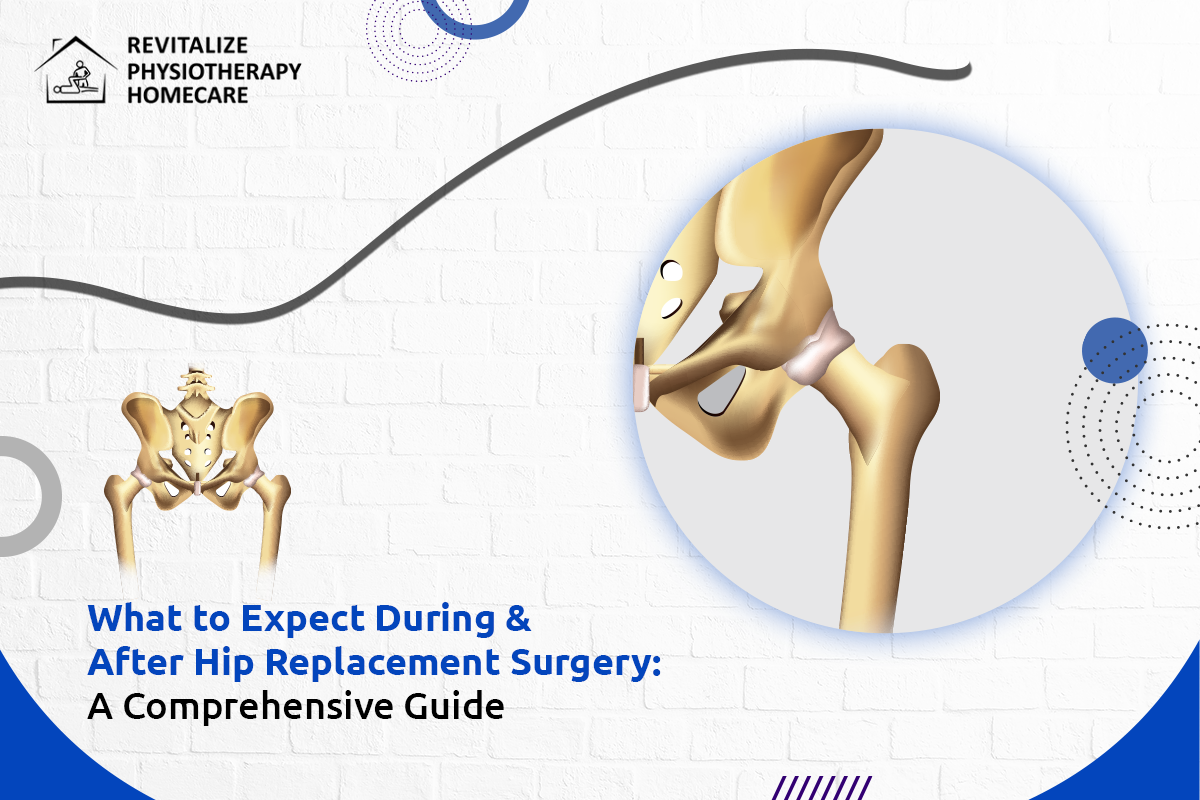What to Expect During & After Hip Replacement Surgery: A Comprehensive Guide
Hip replacement surgery is a common procedure. It improves mobility and reduces pain. It enhances the quality of life for individuals with hip joint problems.
If you're considering or scheduled for hip replacement surgery, you may have questions. You wonder what to expect during and after the procedure. As an experienced physiotherapy clinic in Brampton, in this blog, we have provided a comprehensive guide. It helps you understand the hip replacement process and manage your expectations.
From the surgical procedure to the recovery and rehabilitation phase, we have covered it all. So, let's dive in and explore what lies ahead in your hip replacement journey.
A Comprehensive Guide on Hip Replacement Surgery
What to Expect During Hip Replacement Surgery:
1. Preoperative Preparations
You will go through several preparatory procedures prior to the surgery. That includes medical assessments, imaging testing, and consultations with your orthopedic surgeon.
Now is the time to talk with your doctor about your questions and concerns. Also, your doctor will learn about your medical history, medications, and allergies. And, depending on this information, your surgeon will make some suggestions and alterations.
It includes advising you on dietary restrictions and making medication adjustments. Based on your situation, your surgeon may also recommend some preoperative workouts to you. So that he can maximize your overall health and readiness for the surgery.
2. Anesthesia and Incision
On the day of surgery, you will be administered anesthesia to ensure a pain-free experience. The majority of hip replacement operations are carried out under general anesthesia. But in some cases, regional anesthesia may be used. Once the anesthesia takes effect, your surgeon will make an incision on the side of your hip to access the damaged joint.
3. Joint Resurfacing and Replacement
During the procedure, the damaged parts of your hip joint will be removed. And a prosthetic implant will be placed to replace the hip joint surfaces.
The type of implant used will depend on various factors. And these factors consist of your age, activity level, and the surgeon's preference.
The surgery typically takes a few hours of time. And during that time, your surgeon may use specialized surgical techniques. So that he can minimize tissue trauma and facilitate a faster recovery.
4. Postoperative Recovery
You'll be escorted to a recovery room following the operation. There healthcare professionals will monitor your vital signs. So that they can help you ensure a smooth transition from anesthesia.
You may experience some pain and discomfort initially, which will be managed with pain medications. Physical therapists may also initiate gentle exercises. It will promote blood circulation, prevent blood clots, and encourage early mobility.
5. Hospital Stay
The duration of your hospital stay will depend on various factors. And those factors are your overall health and progress in the recovery process.
Generally, hip replacement patients stay in the hospital for a few days to a week. During this time, you will receive physical therapy, and learn mobility techniques. And also receive guidance on postoperative care and precautions.
What to Expect After Hip Replacement Surgery:
1. Pain Management
After hip replacement surgery, you may experience some discomfort and pain. And it is a very natural part of the healing process. Your healthcare team will prescribe pain medications to help manage your pain effectively.
It is important to communicate any pain you experience with your healthcare providers. So that they know your condition and adjust your medications accordingly.
2. Rehabilitation and Physical Therapy
Rehabilitation and physical therapy play a vital role in your recovery after hip replacement surgery.
In this stage, you will work closely with a Brampton physiotherapist. He will guide you through exercises to improve your strength, flexibility and joint mobility.
The goal of physical therapy is to gradually regain your independence. Plus, restore your normal gait patterns and optimize the function of your new hip joint.
3. Gradual Return to Activities
While recovery times can vary, most individuals can expect to resume light activities within a few weeks of surgery. However, it is crucial to follow your surgeon's guidance. And gradually increase your activity level to avoid complications.
Activities such as driving, returning to work, and participating in sports may need additional time. Plus, it's essential to consult with your healthcare team for specific timelines. As it keeps you from making mistakes and helps you recover faster.
4. Postoperative Precautions
Following hip replacement surgery, you will need to adhere to certain precautions. So that you can protect your new hip joint and ensure proper healing.
These precautions may include avoiding crossing your legs and sitting on low surfaces. Your doctor also suggests you to use assistive devices such as crutches or walkers. Your surgeon will provide detailed instructions on these precautions and their duration.
5. Long-term Follow-up
After hip replacement surgery, you will have regular follow-up appointments. Your orthopedic surgeon will follow up on any issues and track your progress.
During these sessions, your doctor will evaluate your healing progress. Plus, also check the functioning of your new hip joints. Based on this examination, your doctor will make any required changes to your rehabilitation plan.
Conclusion:
For people with hip joint issues, hip replacement surgery can give them a new lease on life.
By understanding what to expect before and after surgery, you can prepare physically and mentally. However, remember to seek the advice and support of qualified healthcare professionals.
At Revitalize, we can make a significant contribution to your rehabilitation and recovery. You may maximize the advantages of hip replacement with our Hip Replacement Treatment Brampton. It will help you reclaim your old mobility and quality of life.
To schedule an appointment with our expert physiotherapists, visit our website now.




